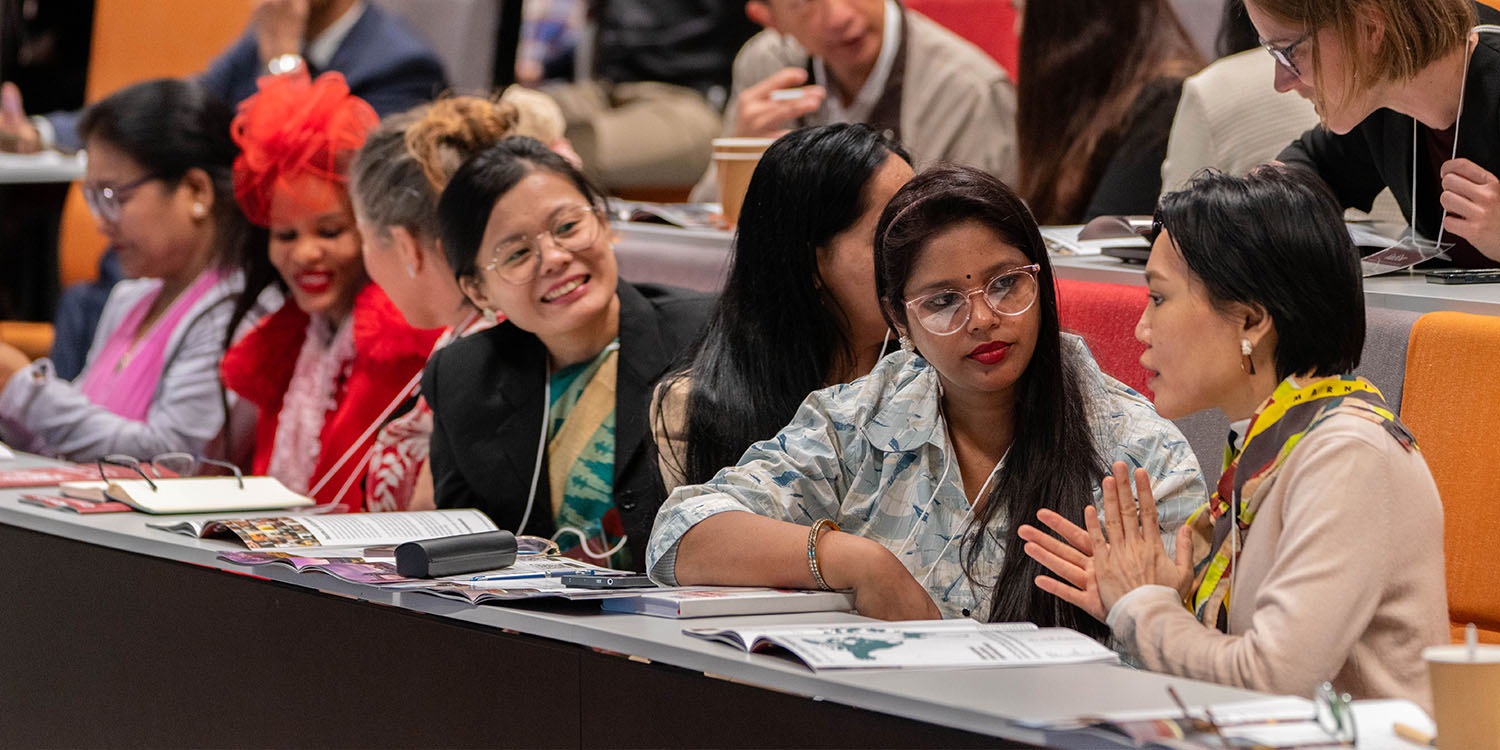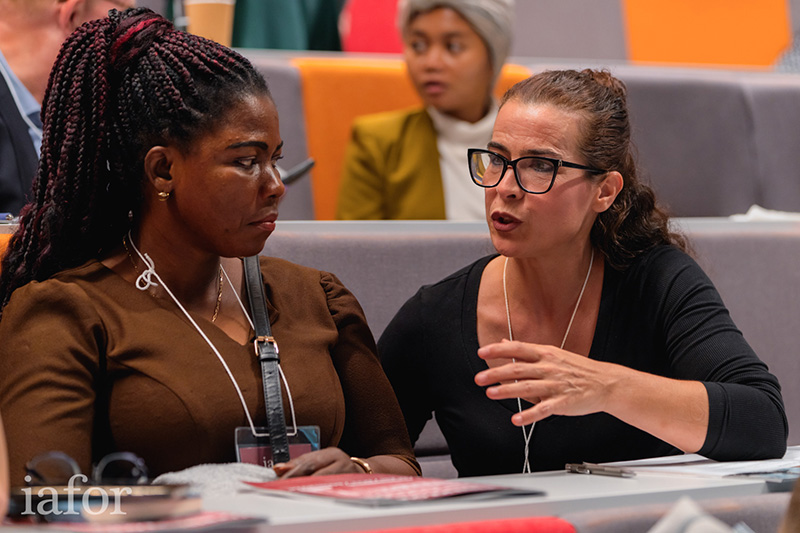The Forum discussion in Kyoto will lead the programme’s ongoing conversation on global citizenship into the Kyoto conferences’ realm of expertise: media, with a lens placed particularly on digital media, its communal uses, and digital citizenship. Delegates interested in participating in The Forum at KAMC/MediaAsia2024 are encouraged to read through this short article as a primer for discussion points and various questions that will be explored during the session.
Globalisation and the rise of information technology have brought about significant social, political, and economic changes. Among these, the transnational movement of people, goods, services, and money, and how we produce and consume information, knowledge, and entertainment, have changed the communication landscape entirely. Around 67.1% of the world’s population today are Internet users, while 63.7% of them use social media (Statista, 2024).
Digital media today has democratised the access to and consumption of information and media from all over the world, fostering empathy and understanding, and creating a sense of global social responsibility. From cultural representation and reproduction through social media platforms such as TikTok in the realms of music, film, and fashion, to travel influencers and tourism promotion on Instagram, and many traditional media news outlets creating their own digital apps, information and news sharing is just one screen-tap away.
This digitisation of information changed the traditional notion of citizenship and civic engagement, giving rise to debates around global and digital citizenship through social media platforms. It is now possible for citizens of any nation to engage with distant countries’ social, economic, and political systems by raising awareness of global issues, and even actively participating in traditional civic activities such as volunteering, donating, and advocating for sustainable development solely through social media. The mobilisation of people through Facebook during the Arab Spring in the 2010s is a striking example of how social media was used for information sharing, resource mobilisation, and efficient organisation of social movements in the digital age. Movements like the #MeToo and #BlackLivesMatter movements also benefited greatly from social media, spreading information globally and raising awareness beyond the United States. Notably, the #MeToo movement’s spread across South Korea occurred quickly and organised a marathon protest – 2018 minutes of nonstop personal retellings of sexual harassment by 200 women – in downtown Seoul. South Korea’s cultural soft power is also felt through social media, with the example of K-pop band BTS’s fandom donating blood and food to charities, raising $1 million for #BlackLivesMatter in only one day, organising charitable fundraising, and creating sustainable development projects worldwide. Digital civic activities are clearly on the rise, transcending borders and cultures.
Another significant civic duty transformed by digital media is the performance of check-and-balance tactics against political elites. While the power to do so was usually transferred to elected politicians and parliaments, it has now become possible to counter the state through bottom-up surveillance. According to Mann et al. (2002), anyone is now capable of recording and uploading videos of government and law-enforcement officials through wearable computing devices and spreading those across the Internet, performing what he coined as ‘sousveillance’ – the bottom-up surveillance of state officials: ‘The filming and photographing of police behaviour during demonstrations can be seen as a passive-aggressive counter-tactic to monitor and expose police or state-sponsored violence’ (Cammaerts, 2015: 6). While media was used as a propaganda tool during the 20th century to steer public opinion, with the introduction of digital media, it has become much more difficult for the state to use media as a form of controlling the masses.
However, this does not mean that digital media has now become a trusted source of information. In fact, in Europe and North America, social media is regarded as the least trusted news source (Statista, 2023). The introduction of digital media and communication has simply transferred the power of information sharing and communication from the few to the many. Issues of source evaluation and the spreading of misinformation have become much more prominent than ever before. The introduction of Artificial Intelligence (AI) raises further concerns about accountability and trust, while it can also violate notions of privacy and intellectual property. It has become difficult to distinguish between original and AI-generated content, so much so that policymakers and social media platforms are now discussing whether digital content should be watermarked when AI-generated (Clegg, 2024; Tong, 2024).
Notwithstanding the positive influence of social media on global citizenship, social media also comes with the danger of perpetuating already existing global sociopolitical injustices, through the reproduction of narratives shaped by colonialism, capitalism, and conflict. An example of this is news reporting and subsequent social media distribution, is the underreporting of the Rohingya genocide or the persecution of the Uyghurs in China, which stands in stark contrast to how the media amplified the reporting of the Palestinian genocide during the recently sparked Israel-Palestine war, as well as reporting on the Ukraine-Russia war. The spread of ‘hate speech’ online is also an issue for concern, with the recent redefinition of ‘freedom of speech’ by Elon Musk on his acquired social media platform X (formerly Twitter) as a threat to marginalised groups. In a legal action against Facebook in 2021, Rohingya victims sued Facebook for £150 billion, claiming that the social media platform had failed to curtail hate speech against Rohingya minorities, which exacerbated negative sentiments and violence against the community (Milmo, 2021).
The digital divide further exacerbates these issues, threatening democracy by marginalising certain groups who lack access to information and communication. The so-called ‘communicative entitlement’ (Couldry, 2007: 252), which allows one to be included in the process of society’s communicative resources, should theoretically enable all voices to be heard, including marginalised people’s ability to not only access information but also put their response back into the communication stream of society. Taking this communicative entitlement away from certain groups creates exclusive media and uneven access to political resources, effectively marginalising the ‘other’. We are reminded of Jan van Dijk’s (2006: 95) words that ‘the central or peripheral position of people inside communication networks, or their exclusion from these networks, will largely determine their position in society’ and that in the future, those ‘who do not have access to the new communication networks, nor the skill to use them or to process and select the information distributed by them, will be powerless’.
The current discussion around social media and global citizenship heavily focuses on critical media literacy. How to foster critical thinking skills and care in what we (re)share online to combat the spread of misinformation, but also agonistic negotiation and public engagement skills to ensure that we act towards mitigating injustice, are questions that remain unanswered in practice. ‘New information technologies and digital networks are increasingly planetary, but they do not by themselves guarantee the advent of global citizenship or the prevalence of cultural dialogue’ (Cruz and Miranda, 2022: 296).
Global Citizenship: Media and Digital Citizenship
Moderators: Dr Virgil Hawkins and Dr Melina Neophytou
IAFOR is inviting delegates to the Forum discussion at this year’s Asian Conference on Media, Communication & Film (MediAsia2024) and The Kyoto Conference on Arts, Media, and Culture (KAMC2024) to discuss questions about global citizenship and the responsible production and consumption of information, knowledge, and art in the digital era. Touching upon issues of representation, power, colonialism, capitalism, Artificial Intelligence, freedom of speech, and critical media literacy, we ask delegates to discuss the following questions:
Place: Kyoto Research Park Building #1, Science Hall (4F)
What to bring: A smartphone with a QR-reading function
References
Cammaerts, B. (2015) Social Media and Activism. In: Mansell, Robin and Hwa, Peng, (eds.) The International Encyclopedia of Digital Communication and Society. The Wiley Blackwell-ICA International Encyclopedias of Communication series. Wiley-Blackwell, Oxford, UK, pp. 1027-1034.
Clegg, N. (2024, February 14). Labeling AI-Generated images on Facebook, Instagram and threads. Meta. https://about.fb.com/news/2024/02/labeling-ai-generated-images-on-facebook-instagram-and-threads/
Couldry, N. (2007). New Media for Global Citizens? The Future of the Digital Divide Debate. The Brown Journal of World Affairs, 14(1), 249–261. http://www.jstor.org/stable/24590705
Cruz, M. T., & Miranda, M. (2022b). Storytelling as media literacy and intercultural dialogue in Post-Colonial societies. Media and Communication, 10(4), 294–304. https://doi.org/10.17645/mac.v10i4.5814
Mann, S., Nolan, J., & Wellman, B. (2002). Sousveillance: Inventing and using wearable computing devices for data collection in surveillance environments. Surveillance & Society, 1(3), 331–355. https://doi.org/10.24908/ss.v1i3.3344
Milmo, D. (2021, December 6). Rohingya sue Facebook for £150bn over Myanmar genocide. The Guardian. https://www.theguardian.com/technology/2021/dec/06/rohingya-sue-facebook-myanmar-genocide-us-uk-legal-action-social-media-violence
Statista. (2024, January 18). Most trusted sources in the world 2023. https://www.statista.com/statistics/381455/most-trusted-sources-of-news-and-info-worldwide/
Statista. (2024, August 19). Worldwide digital population 2024. https://www.statista.com/statistics/617136/digital-population-worldwide/
Tong A. (2024, August 27). OpenAI supports California AI bill requiring 'watermarking' of synthetic content. Reuters. https://www.reuters.com/technology/artificial-intelligence/openai-supports-california-ai-bill-requiring-watermarking-synthetic-content-2024-08-26/
Van Dijk, J. (2006). The Network Society: Social Aspects of New Media. Sage Publications (CA).




